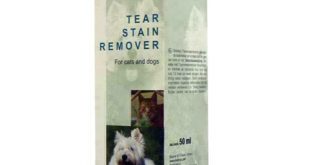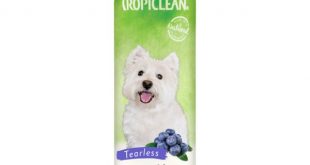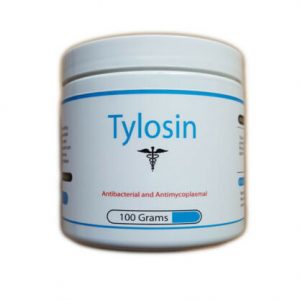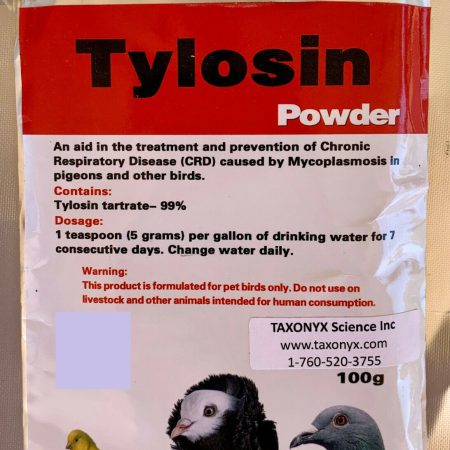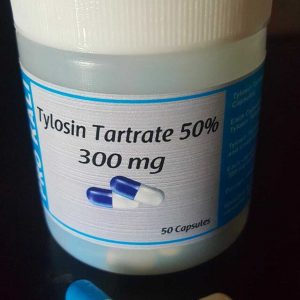Tylosin, a naturally-occurring macrolide compound, has a long history of use in veterinary medicine. Initially employed to combat diseases resistant to other drugs in poultry and livestock, it has become a common treatment for cats and dogs, addressing issues such as colitis, intestinal infections, soft tissue infections, and even tear stains in animals. You can acquire Tylosin Powder by clicking here.
If you would like to buy Tylosin Powder, click here.
-
 Tylosin Soluble Powder 100 gramsOriginal price was: $72.00.$65.00Current price is: $65.00.
Tylosin Soluble Powder 100 gramsOriginal price was: $72.00.$65.00Current price is: $65.00. -
 99% Tylosin Powder 100 GramsOriginal price was: $79.00.$75.00Current price is: $75.00.
99% Tylosin Powder 100 GramsOriginal price was: $79.00.$75.00Current price is: $75.00. -
 Tylosin 25 mg per Capsules Soluble PowderOriginal price was: $95.00.$89.00Current price is: $89.00.
Tylosin 25 mg per Capsules Soluble PowderOriginal price was: $95.00.$89.00Current price is: $89.00.
Being a macrolide, Tylosin exerts a bacteriostatic effect on susceptible organisms, stalling infections rather than eradicating them. This pause allows the immune system to catch up by inhibiting the synthesis of RNA-dependent proteins, making it especially effective against gram-positive bacteria. While some prefer exploring alternative treatments before Tylosin, there are instances where immediate use is advisable, such as in Tear Stain removal. The benefits of this will be discussed later in this article. Tylosin Powder is marketed under the brand name Tylan Powder and you will often see it referred to as such. Its important to note however that the branded name Tylan Powder no longer contains the key ingredient Tylosin which is important for Tear stain removal.
Bacterial Infections and Tylosin
Due to its potent antibacterial properties, Tylosin primarily combats bacterial infections in farm and poultry animals. Derived from Streptomyces fradiae, an actinomycete, this macrolide antibiotic is often the last resort to tackle diseases that don’t respond to other treatments.
It’s important to note that the Food and Drug Administration (FDA) hasn’t approved Tylosin for use in domestic animals to treat bacterial infections. Nevertheless, it’s a prescription extra-label drug available through veterinarians and is best administered by professionals. However, Tylosin doesn’t require a prescription for treating Tear Stains in dogs and Tylosin Responsive Diarrhea. Over the years, Tylosin has also been employed in livestock, such as pigs and cows, to enhance their growth and prevent infectious diseases. Let’s delve into the constituents of Tylosin.
Ingredients Found in Tylosin Powder
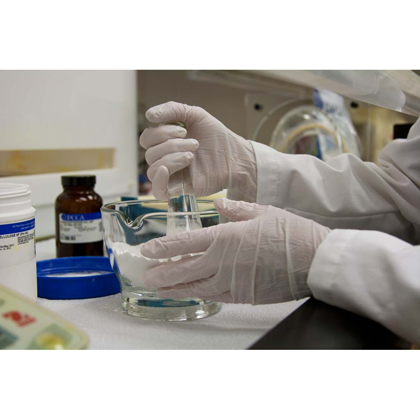
Tylosin is typically available in three forms: injectable liquid, soluble granules, and soluble powder. It exhibits a broad spectrum of activity against gram-positive organisms and a limited range of gram-negative ones. Tylosin consists of four major components: Tylosin A, B, C, and D, with Tylosin A being the most significant, while B, C, and D contribute to its overall potency.
Recommended Dosage of Tylosin Powder for Dogs
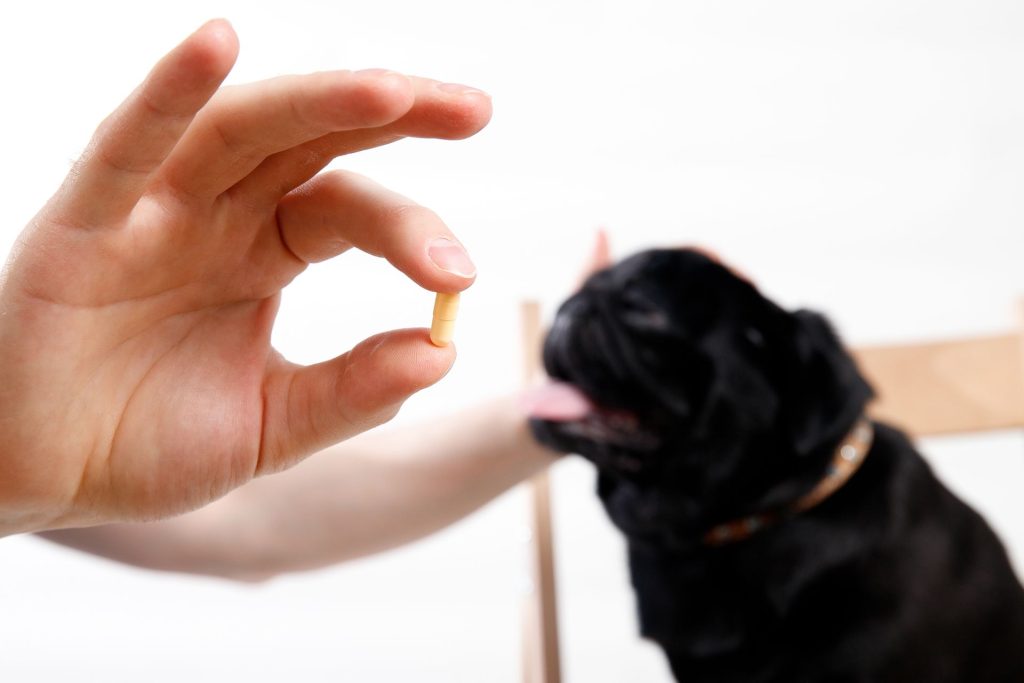
Dosages for Tylosin powder vary based on the condition being treated and the dog’s weight. Tylosin comes in different formats, either powder or liquid, and can be administered orally or via injection. In 1976, Van Kruingen was the first to highlight the use of Tylosin in treating canine colitis. He conducted a study on the clinical efficacy of Tylosin in inflammatory bowel diseases in dogs. The study included 27 dogs receiving an oral dosage of Tylosin ranging from 11 to 200 mg/kg. They were administered twice daily, and the treatment duration ranged from one week to five years. Decades later, another study was conducted on seven dogs suffering from secondary chronic diarrhea due to exocrine pancreatic insufficiency. These dogs received Tylosin for 5-6 days at a dose of 15 mg/kg twice daily as an adjunct to pancreatic enzymes. In 2005, Westermarck et al. introduced the term “Tylosin-responsive diarrhea.” This case series involved nine client-owned dogs with recurrent diarrhea responding to Tylosin at a dose of 6 to 16 mg/kg once daily for two weeks.
Here is a very helpful chart with the recommended dosages for Tear Stain removal:
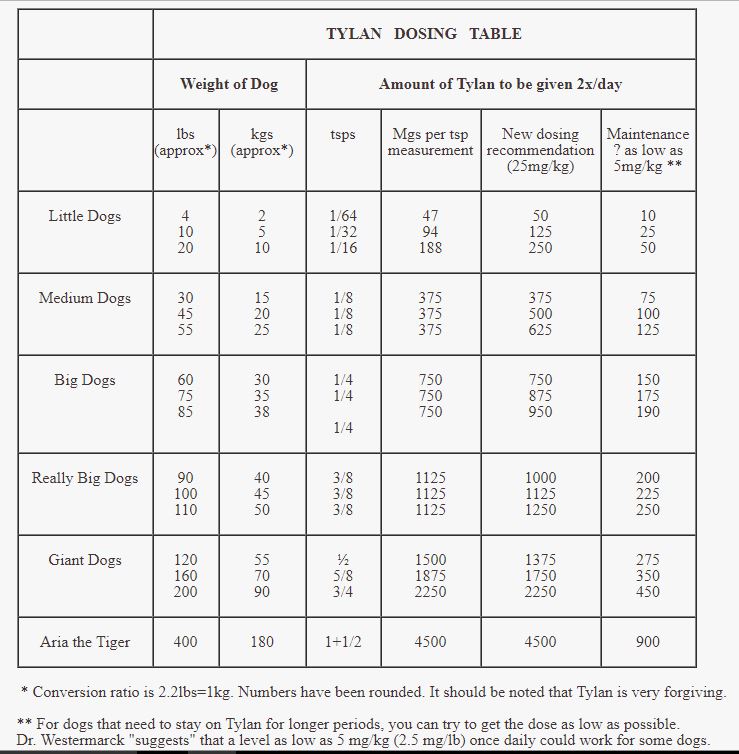
Tylosin varies widely so as the prescription and administration vary too. Tylosin comes in different dosages and format and administered differently (either orally or through injection). They can be in form of powder, injectable oral liquid and capsule formulations.
The duration of administration depends on the condition being treated, the response to the substance and subsequent development. In dogs, the usual dose is 5 to 10 mg or 10 to 20 mg/kg every 2 hours for up to six weeks. A recent random study showed the effect of Tylosin on fecal consistency in dogs with recurrent diarrhea. At a dose of 25mg/kg once daily for seventy days, Tylosin proved more effective than placebo.
it is important to mention that there is no standard recommendation of the administration of Tylosin on dogs due to factors ranging from the nature of the illness, the weight and age of the animal. For this reason, veterinary professional advice or recommendation must be considered before the treatment of an infection with Tylosin. Doses can vary widely depending on the reason for prescribing.
The duration of administration depends on the condition being treated, the response to the substance and subsequent development. A study on the effect of Tylosin on fecal consistency in dogs with recurrent diarrhea proved to be very successful at a dose of 25mg/kg once daily for seventy days.
What Can Tylosin Powder be Used For?

Tylosin Powder finds common usage in dogs for two primary reasons: relief from digestive issues and cosmetic benefits. In small mammals, its anti-inflammatory properties are more frequently utilized than its antibiotic properties, especially in colitis treatment.
Relief from a variety of digestive disorders
Tylosin Powder can treat various digestive tract disorders, including chronic diarrhea, colitis, inflammatory bowel disease, and exocrine pancreatic insufficiency, particularly when other medications prove ineffective. It’s often administered to dogs with diarrhea associated with the aforementioned conditions. Tylosin acts quickly, and its anti-inflammatory properties offer significant relief from symptoms caused by an overworked and painful intestine.
Treating Infections and Tear Stain Removal
Tylosin Powder is often prescribed to reduce excessive tear stain production in dogs and cats to prevent staining or coat discoloration. It has gained popularity in small dog breeds like Shih Tzus and Maltese, which are prone to developing tear stains.
Over the years, Tylosin powder has also been employed to treat chronic diseases like diarrhea and aid in the management of respiratory and digestive infections in animals. In poultry, it’s administered to chickens and turkeys to treat unresponsive respiratory infections. It’s also effective against infectious diseases that are less susceptible to other antibiotics, such as chronic diarrhea, colitis, and exocrine pancreatic insufficiency.
Tylosin’s wide application across various animal species is due to differences in formulations, administration methods, and approvals for treatment in different countries. For example, small animals are given Tylosin to treat colitis, while animals with white coats prone to epiphora and tear staining are administered Tylosin to enhance their fur’s appearance. Other infections treatable with Tylosin include respiratory infections, metritis, acute mastitis in cattle, mastitis in sheep and goats, enteritis, pneumonia, erysipelas, and infectious arthritis in swine, as well as soft tissue infections in small animals.
Tylosin can be used over the long term, as it is safe for extended use and provides a viable alternative to metronidazole, another bowel anti-inflammatory antibiotic that’s less suitable for long-term application.
Seek Advice from Your Vet before Use

But before administering ,it is advisable to make use of other antibiotics first or seek the advice of a veterinary professional as that is more preferable. Still, Tylosin can be used on ferrets, rabbits, birds, reptiles, and pockets pets etc.
This macrolide substance can also be used to treat other infections of the organ system, notable the respiratory tract and the skin. Despite the numerous usage of Tylosin, it can’t be given to horses as it increases their blood levels and disrupts their immune substance.
Possible Side Effects of Tylosin Powder in Dogs

Since Tylosin is yet to be approved by the FDA (Food and Drug Administration) for the treatment of dogs and cats, it means that only veterinary professionals should administer the substance to prevent the animals from suffering from its side effect. These side effects can cause serious potential damage to the health of the patient. It is important to know the side effect to avoid damages.
Long Term Use
Firstly, the long term use of Tylosin can put a dog at risk, their immune system may develop resistance to other antibiotics medications that may be necessary to treat other diseases or infections in the future. This negative mutation causes their immune system to develop antibiotic resistance to other treatment when fighting new diseases or infections.
Possibility of Relapse and Tylosin Responsive Diarrhea
There is also a high tendency of relapse of the infection or disease. Scientist are yet to understand the substance properly, they report that the application of Tylosin may worsen the problems it intends to solve. This may occur in the treatment of chronic diarrhea and it is referred to as Tylosin Responsive Diarrhea (TRD).
Tylosin Responsive Diarrhea means that the medication could offer a quick solution to the dog’s digestive upset or infection, but there is a possibility that it may return within a few weeks of coming off the medications.
Animals with Hypersensitivity
Another side effect is that Tylosin cannot be administered to animals with known hyper-sensitivity or allergy to the drug or other macrolide antibiotics. The administration of the substance may worsen the problem it intends to solve. It is also reported that Tylosin does not react well with other antibiotic dosages.
Weakened Immune System of Some Dogs
The substance does not react well with secondary substances and it can weaken the immune system of the dog and leave it susceptible to other mild diseases in the future. This is one of the reason it is important to seek the assistance of a veterinary professional before the administration or the medication of Tylosin.
Increase in Blood Pressure
Tylosin, when administered to dogs, can increase their blood pressure. When it comes into contact with other substance in the body, the reaction can increase the level of toxicity in the body which may have a negative effect on the animal.
Tylosin also has a foul taste, which is often hard to disguise or take into the body. This is a minor effect that results from the oral administration of the substance. The foul taste often causes the patient to shy away from oral administration of the substance of the substance itself.
In conclusion, some of the minor side effects that may result from the use of Tylosin include pain and local irritations at the injection site, diarrhea, anorexia, and an increase in blood levels.
While not necessarily side effects, there are quite a few issues associated with the use of Tylosin that should be seriously considered.
Allergies
As with any other medicine, Tylosin should not be given to dogs with known hypersensitivity or allergy to the drug or other macrolide antibiotics
Bad Taste
Tylosin Powder has a particularly strong and unpleasant taste that is hard to disguise, making oral administration to dogs quite difficult. Gastrointestinal disturbance, resulting in diarrhea, may occur right after oral administration
Skin Itching
When administering via injection, skin itching may occur around the spot of injection.
Resistance
Tylosin is an antibiotic, which means it carries the risk of a dog developing resistance to it, making it increasingly difficult for its body to fight off future infections.
Log Term Use
Long-term effects of use of Tylosin have not been researched enough: Because of this, it is important to consider alternatives before resorting to Tylosin. For example, billberry extract is a great natural alternative to Tylosin which can help with tear staining. Studies state that Tylosin’s mechanisms of action are not fully understood yet and that its successes are anecdotal rather than scientific. This is why long-term use is not advocated
Antibiotics
Use with other antibiotics: It is reported that Tylosin does not react well with other antibiotics. When it comes into contact with other substances in the body, the reactions can dangerously increase levels of toxicity
Increase in Blood Pressure
It has been reported that Tylosin can increase dogs’ blood pressure
- As a substance that works by helping the immune system rather than fighting a disease, there is also a high tendency of relapse of the infection: For this reason, it is suggested that Tylosin is better used as a last resort option when other drugs have failed to resolve the underlying health issue.
When Tylosin is given to a dog for the first time, owners should monitor it closely to make sure there are no serious side effects. If there is any change in the behavior of the dog, it is important to discontinue use.
How to Administer Tylosin
- Orally, it can be administered to dogs in powder via capsule formulations. Veterinary compounding pharmacies can add flavorings to these to disguise the substance’s strong taste and make it more palatable for dogs. It can also be administered through liquid via teaspoonful.
- Via injection.
Where Can I Buy Tylosin?
Tylosin can be purchased at the here on this website.
Top Tylosin Products for Dogs
They are various Tylosin product in the market, some of the top and best recommended choices are:
1. Tylan Soluble Powder
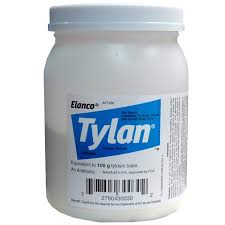
Tylan Soluble Powder is an antibiotic food additive used in veterinary medicine to treat bacterial infections in a wide range of species, including farm animals. In chickens, it is as an aid in the treatment of (CRD) chronic respiratory disease, in turkeys it helps to reduce the severity of effects of infectious sinusitis, in swine in help to treat and control dysentery, and in honey bees, it can help control American Foulbrood. It may also be recommended for off-label use in dogs and cats.
2. Elanco Tylan 50
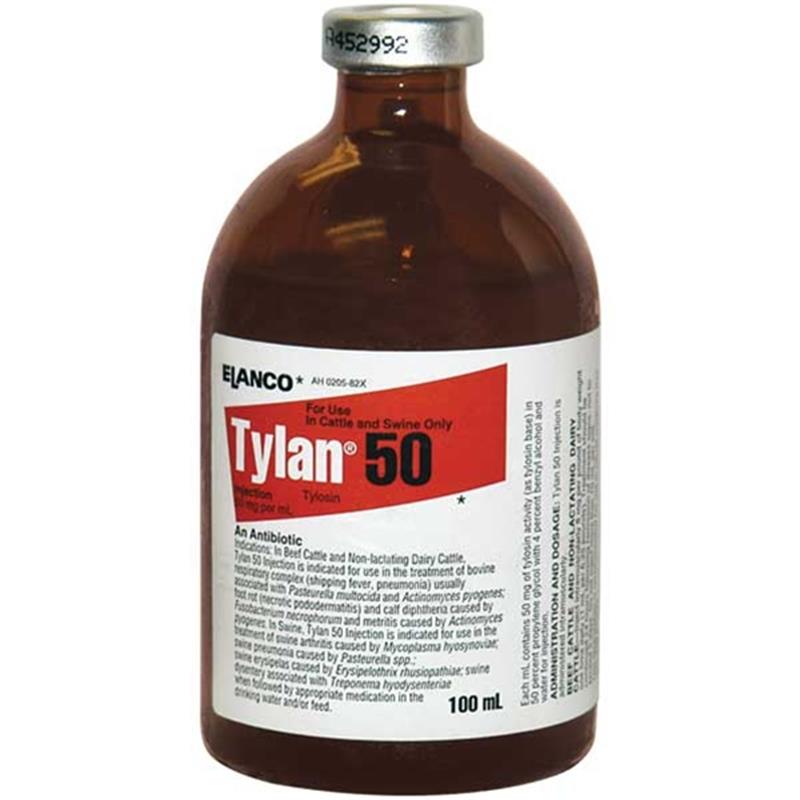
Tylan 50 Injection by Elanco is an antibiotic for use in cattle and swine only for the treatment of certain diseases. Each mL contains 50 mg of Tylosin activity in 50 percent propylene glycol with 4 percent benzyl alcohol and water for injection. Tylan 50 injection is administered intramuscularly.
3. Tylosin 50 100g Soluble Powder
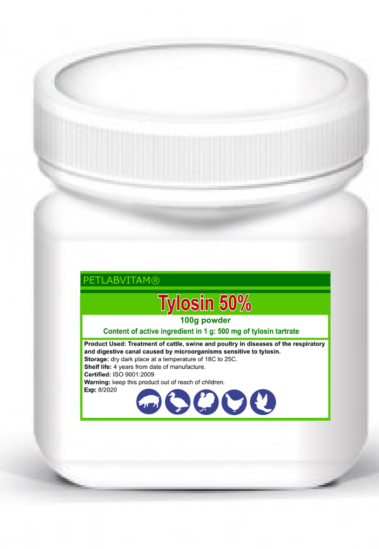
Tylosin 50 100g Soluble Powder is an antibacterial powder which is white to light yellow in color with a specific smell. It is composed of Tylosin tartrate 500 mg and is used on chicken and pigs. It is used for the prevention and treatment of enteritis in poultry, Glasser’s disease, vibriosis, spirochetosis, infectious sinusitis, synovitis, chronic respiratory diseases caused by pathogens sensitive to Tylosin.
While it is administered to pigs for the prevention of prevention and treatment of animals dysentery, necrotic enteritis, gastroenterocolitis, caused by pathogens sensitive to Tylosin.
4. Tylan 200
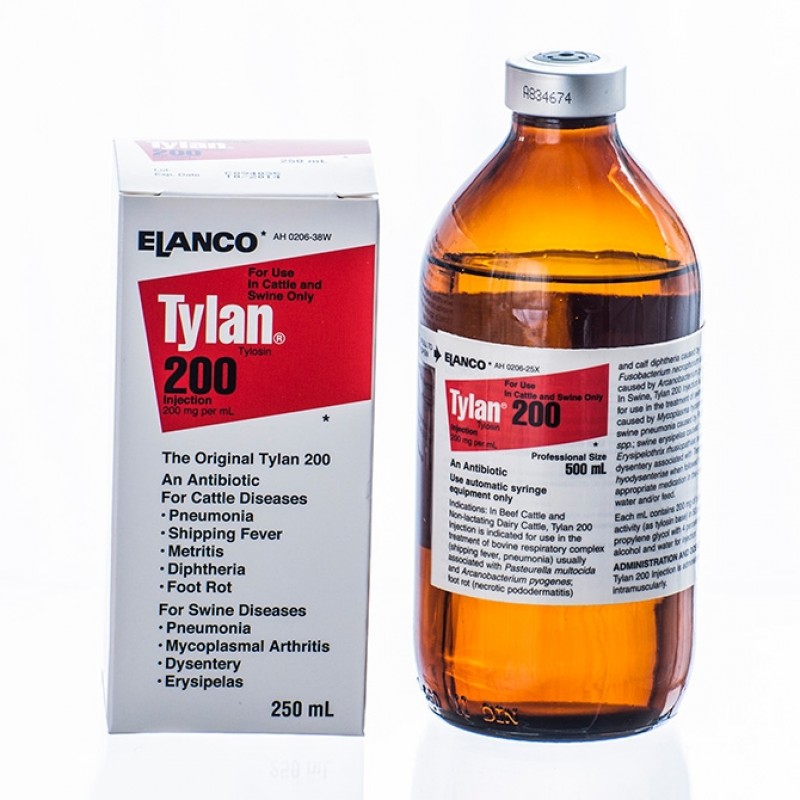
This is an antibiotic medicine containing 200 mg Tylosin per ml. Tylan 200 is administered intramuscularly and is used in the treatment of diseases including bovine respiratory complex (shipping fever, pneumonia), foot rot, and diphtheria in beef cattle and non-lactating dairy cattle. It is used for the treatment of pneumonia and dysentery in swine weighing at least 25 lbs.
Tylosin vs Metronidazole
Metronidazole is an antibiotic that is used to treat a wide variety of infections Giardia, Entamoeba, Trichomonas, and Balantidium. It also is used to treat anaerobic bacterial infections. It works by stopping the growth of certain bacteria and parasites. Metronidazole treats only certain bacterial and parasitic infections. It will not work for viral infections (such the as common cold and flu).
It can also be used with other medications to treat certain stomach/intestinal ulcers caused by a bacteria (H. pylori). Also, Metronidazole is a prescription antibiotic used in dogs and cats to treat various conditions such as inflammatory bowel disease, nonspecific diarrhea disorders, infections caused by Giardia, and periodontal disease. It treats a wide variety of disease and effectively stops inflammatory bowel disease.
Metronidazole is especially effective against anaerobic infections – bacteria that can live without oxygen. Possible side effects of metronidazole use in dogs and cats include Allergic reaction (labored breathing, hives, etc.), Drooling and gagging (the drug is very bitter), Vomiting, Loss of appetite, Diarrhea, Lethargy, Blood in the urine, or dark urine and Liver damage.
Frequently Asked Questions (FAQ) about Tylosin Powder

1. Are Tylosin Powder and Tylan Powder the Same?
Tylosin Powder, also prescribed under the names Tylan and Tylocine, is a macrolide antibiotic. Macrolide antibiotics are bacteriostatic medications, which means that they do not kill bacteria.
2. What is Tylosin Used for in Dogs?
Tylosin is an antibiotic typically used to treat bacterial infections in farm animals, but veterinarians often use it to treat certain types of chronic diarrhea in cats and dogs as well as Tear staining in Dogs. In some countries the powdered form is not approved for use in companion animals with bacterial infections, but it is common practice for veterinarians to prescribe this medication.
3. Is Tylosin Safe for Dogs?
Although Tylosin is yet to be approved by the FDA, veterinary professionals for the most part agree that the substance is safe and effective for treatments of Tear staining in dogs and other animals.
4. How do I Administer Tylosin to my Dog?
It is highly recommended that advice of a veterinary professional is sought before administering Tylosin. However, the administration can be done either orally or injected into the body.
5. What is Tylosin Responsive Diarrhea?
Tylosin Responsive Diarrhea (TRD) is the relapse of chronic diarrhea after administering Tylosin to a Canine. A major feature of this is that diarrhea usually stops within a few days after use, however after administration ceases diarrhea often reappears within a few days. Tylosin-responsive diarrhea (TRD) is most typically seen in middle-aged, large-breed dogs.
6. What are other common names for Tylosin?
Tylosin can also be prescribed under the names Tylan and Tylocine. They are the same substance, which is a macrolide antibiotic.
7. Is Tylosin used for Domestic animals?
Tylosin was originally used to treat bacterial infections in farm animals, but it has gained favor with veterinarians in recent years. It is now used it to treat certain types of diseases and infections in dogs and cats. The FDA has only approved the use of Tylosin for farm animals, but professional veterinarians can legally prescribe Tylosin as medication.
8. What if my dog doesn’t respond to treatment with Tylosin?
Your dog not responding to treatment using Tylosin is a possibility to be considered, because as a macrolide substance, Tylosin does not actually kill bacteria in the body. In this case, alternative treatment should be sought, as long-term use of Tylosin is discouraged.
9. Can Dogs be on Tylosin for Life?
Even though long term use of Tylosin is discouraged because of the potential for the development of bacterial resistance, there isn’t a limit on the length of time Tylosin can be used for Tear Stain removal.
10. How Quickly Does Tylosin Work?
Depends on what your are using it for. For Tear Stain removal you may notice results in as short as a week. For diarrhea, it can work in as shot as 24 hours and may take up to three days.
Conclusions
Tylosin powder is a very effectve treatment for Tear Staining in dogs, however as with every drug, it is highly recommended that dogs are monitored when taking this medication. While there are no major side-effects associated with the use of Tylosin Powder, dogs may present some gastrointestinal problems after first taking it. However, if a dog’s behavior changes after taking Tylosin for the first time, it is important to mention that to the veterinarian in order to assess whether to discontinue the medication. Allergies are also not uncommon.
Cautious use of Tylosin under a veterinary professional’s guidance can provide significant health benefits to dogs.
 Total Pooch Dog Supplements, Tear Stain Removers, De-wormers, Tylosin for Dogs and other great products.
Total Pooch Dog Supplements, Tear Stain Removers, De-wormers, Tylosin for Dogs and other great products.

